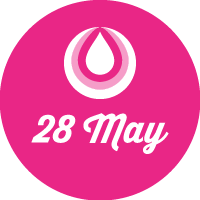 The average length of a menstruating person’s period is five days. The average length of a menstrual cycle is 28 days. Those numbers inspired advocates around the world, and our own Women’s Philanthropy activists, to declare Menstrual Equity Day on 5/28.
The average length of a menstruating person’s period is five days. The average length of a menstrual cycle is 28 days. Those numbers inspired advocates around the world, and our own Women’s Philanthropy activists, to declare Menstrual Equity Day on 5/28.
Providing menstrual supplies to Atlantans who cannot afford them has been a major focus of Women’s Philanthropy for more than a year. Through Project Dignity, our women have engaged friends, families, and Jewish teens from JumpSpark to collect and distribute more than 100,000 menstrual supplies across Atlanta. Lori Peljovich, who helps lead the initiative says, “It’s been a great hands-on way to have an impact during the pandemic because much of the shopping can be done online. I’ve been so impressed by the women of our community when asked to step up and engage.”
“Project Dignity has been so successful that we’ve been able to partner with a number of organizations in our community to expand our reach,” Peljovich said. “We were overwhelmed by the response, and we will try to do collection drives twice a year in order to keep increasing our distribution to those in need.” To get involved contact: Yael Sherman, Director of Women’s Philanthropy, ysherman@jewishatlanta.org
Some surprising facts about menstruation equity:
- In her lifetime, a woman will spend approximately 3,500 days (equivalent to almost 10 years) menstruating.
- Approximately 70 percent of women use tampons and may use 11,000-15,000 in their lifetime.
- 1 in 10 college students in the U.S—a relatively privileged group—experience period poverty, which has clear ties to stress-related mental health.
- In a 2019 study of low-income women, almost two-thirds of respondents reported not being able to afford the products they needed in the last year.
- According to a 2019 study, 1 in 5 teens in the U.S. could not afford period products, and 1 in 4 have missed class because they did not have access to pads or tampons.
- In the state of Georgia, we have Georgia STOMP (Stop Tax on Menstrual Products), working in the legislature to eliminate the 4 percent state tax on items necessary to manage periods. Georgia STOMP has over 15,000 members and helped to introduce HB 8, which has yet to pass.
According to NY Rep. Carolyn Maloney, 2021 ushered in major policy reforms for menstrual equity around the world. New Year’s Day marked the end of the tampon tax in England —the culmination of a seven-year organizing campaign. Scotland made history as the first nation to mandate free period products to anyone in need.
Here in the United States, there have been notable advances, too. Back in March, when Congress passed the CARES Act, it included a long-sought provision: reclassification of menstrual products as qualified medical expenses, meaning they now can be purchased with pre-tax dollars via employee health savings and flexible spending accounts.




